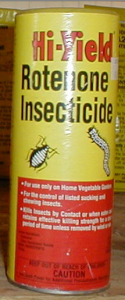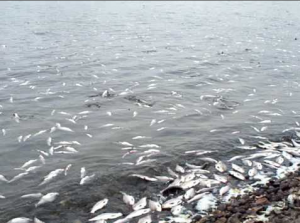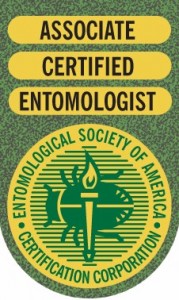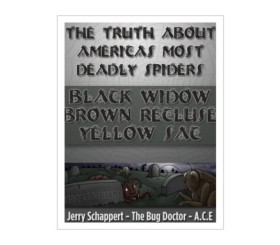Rotenone is a botanical insecticide which occurs naturally in the roots and stems of several plants. Florida fishpoison tree, Cork-Bush, Jewel Vine, Tuba Plant, Cubé Plant, Jícama and Hoary Pea or Goat’s Rue are some known plants where rotenone is derived from. It has been used for centuries by indigenous peoples from South America and Africa to catch fish, (actually it kills them and they float to the surface) and as an insecticide to protect foods and parasite treatment used directly on poultry, pets and other animals. It was eaten for food and used as an antidote for medical problems like scabies and chiggers. This is normally the stuff of legends in the organic world but for some reason rotenone is living out a quiet existence and is perhaps as of this writing all but dead- There is no real out cry, no call of foul and even though it is considered a major concern for our health rotenone itself has not made any major headlines. Why?
Read On
Rotenone got a very fast start in America because of it’s powerful insecticidal properties. Developed as powders, liquid or aerosols the history of it’s use in the U.S. is briefly this;
history of it’s use in the U.S. is briefly this;
1922 Rotenone insecticides reported effective for control of cattle grub and cattle louse.
1931 Rotenone importation, 5,000 pounds.
1932 Rotenone dust treatments developed for control of turnip aphid.
1933 Rotenone dusts and sprays developed for control of Mexican bean beetle.
1934 Rotenone-bearing insecticides developed for control of flea beetles on cigar wrapper tobacco, raspberry fruit worm, and pea weevil.
1935 Rotenone- and pyrethrum-bearing dusts developed for control of cabbage caterpillars, without incurring harmful residue hazard. Rotenone-bearing dusts proved effective in control of pea aphid.
By 1943 however, DDT was developed and it seems rotenone had lost any steam it had of becoming a household product. This is not to say it wasn’t used anymore or that DDT replaced it. In fact one company has sold a line of insecticidal products since 1926 to present day featuring rotenone but the miracle botanical never gained that much traction outside of home and organic gardeners.
Is It Toxic?
Listed as mildly toxic to humans rotenone is extremely hazardous to fish and insects. It causes paralysis and inhibits oxygen uptake and is a stomach poison to insects. Human fatality is rare with rotenone because if ingested it almost always causes vomiting and it is not readily taken through the skin or intestinal tract. Inhalation is more toxic than ingestion and emulsions of rotenone is higher still. Rotenone does not linger long once applied- 6 days at most but is still deemed safe for application directly to garden produce.
Touted as natural, organic and safe, rotenone was listed as an NOP pesticide (National Organic Program) but was removed in 2005. With little fan fare it was reinstated in 06 but with restricted use. The reinstatement lasted only a few short years according to a February 11, 2011 press release from the National Institute of Health.
There are no home garden or residential uses for either paraquat or rotenone currently registered. Paraquat use has long been restricted to certified applicators, largely due to concerns based on studies of animal models of Parkinson’s disease. Use of rotenone as a pesticide to kill invasive fish species is currently the only allowable use of this pesticide.
Since this release, the news of insecticide linked to Parkinson’s has made it to many blogs and news outlet head lines. You’ll notice the words in bold don’t mention the organically approved rotenone. That’s because every alert, release and blog or non scientific speak web site I could find that has picked up this story has left out the fact that only 3 pesticides are in the spot light for this connection but by reading the tag lines and headers one is led to believe that ALL Insecticides are to blame. The three are, rotenone=insecticde, paraquat= herbicide and Maneb=fungicide. When or if rotenone is mentioned it is almost always buried deep in the article far away from the damning headline and way past the amount of any article the average reader would get to. Instead, the meat of the articles warn wary readers of evil pesticide exposure or any pesticide application that is not, according to them, natural. Conclusive words and bold claims are carefully surrounded by words like “may be“- “possible“-“mounting evidence” and “consensus implies” but these descriptive phrases are all but swallowed up in the fury of the implications.
 I believe this is a bit dishonest don’t you? For years we’ve heard nothing but pesticide bashing. How somehow our better lives without insects are really not better because we all have cancer and pesticide caused disease. That even though our industry has made great strides in education, better chemistry and possess the best application equipment we’ve ever had. We, the pest professionals are killing ourselves, killing you, your pets and this earth. It is only by banning the likes of us and our methods that redemption can be made and mankind can again stand proud. Well now it is apparently one of your products on the firing line yet I don’t hear a peep. Perhaps you should have considered the trail you blazed because murmurs of equal testing are being heard in the not so far distance. Much like fishing with rotenone, it only takes a small amount to poison the whole pond and the fish who were just happy to get along never had a chance.
I believe this is a bit dishonest don’t you? For years we’ve heard nothing but pesticide bashing. How somehow our better lives without insects are really not better because we all have cancer and pesticide caused disease. That even though our industry has made great strides in education, better chemistry and possess the best application equipment we’ve ever had. We, the pest professionals are killing ourselves, killing you, your pets and this earth. It is only by banning the likes of us and our methods that redemption can be made and mankind can again stand proud. Well now it is apparently one of your products on the firing line yet I don’t hear a peep. Perhaps you should have considered the trail you blazed because murmurs of equal testing are being heard in the not so far distance. Much like fishing with rotenone, it only takes a small amount to poison the whole pond and the fish who were just happy to get along never had a chance.




